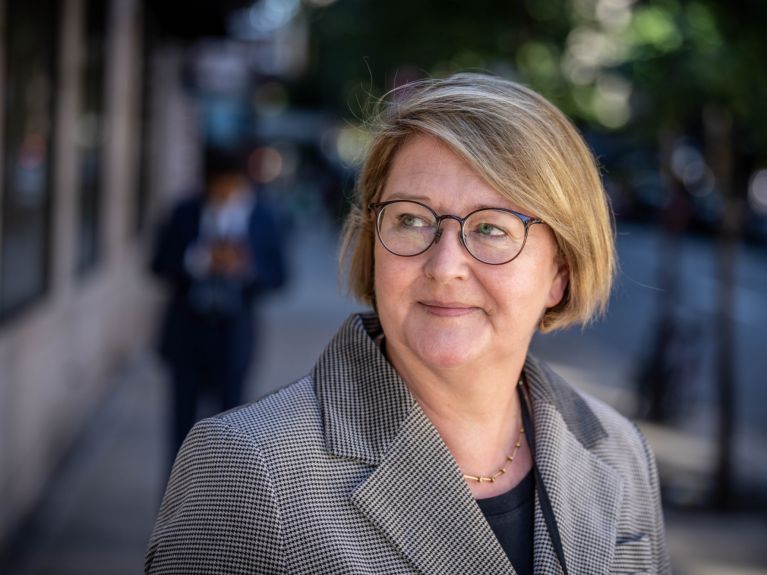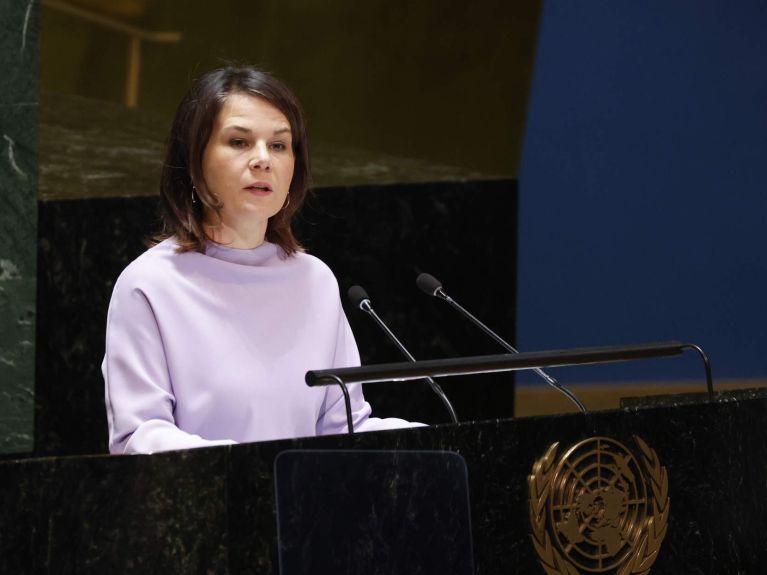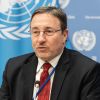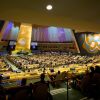“Forging a common pact for the future”
Antje Leendertse, Permanent Representative of Germany to the United Nations, on the country’s changed role after 50 years of UN membership.

Madam Ambassador Leendertse, September marks the fiftieth anniversary of Germany’s accession to the United Nations. How has Germany’s role in the UN changed over the past decades and how would you describe this role today?
One change is obvious: two became one. On 18 September 1973, the flags of two German states were hoisted at the UN in New York. Now, fortunately, only the flag of a reunited Germany flies on the East River. During the bloc confrontation of the Cold War and shortly after the unspeakable suffering that Germany inflicted on millions of people during the Second World War, Germany’s role at the UN was more limited than it is today. A commitment to human rights was a key concern from the beginning, of course. But it was only in recent decades that other fields of activity began to develop, such as our active involvement in peacekeeping missions. Today, Germany is a central force in the United Nations. Our aim is to be a pillar of multilateralism – not only financially as a leading donor, but politically and conceptually, too. Incidentally, the mandate under the German constitution to serve world peace has remained unchanged.
Germany is committed to strengthening the United Nations. What opportunities do you see for change in view of the worldwide crises and increasing divisions in the global community to some extent?
It’s true that the Russian war of aggression against Ukraine marks a watershed moment – not only for Germany. This fundamental breach of the UN Charter is shaking the foundations of the United Nations itself, too. In addition, the pandemic and the climate crisis are creating deep divisions. This is precisely why we’re working that much harder every day to deepen global partnerships in and with the UN – partnerships based on shared rules and law rather than the arbitrariness of violence. We face a reality that is multipolar, but that doesn’t automatically cement divisions in the world. Our task right now is to bring multipolarity and multilateralism together. And we must seriously try to balance the growing inequalities and vulnerabilities in the world. This includes making a strong case for Agenda 2030 with the Sustainable Development Goals, which are coming under a lot of pressure.
Our task right now is to bring multipolarity and multilateralism together.
A reform of international law is under discussion, too. What has to change from Germany’s point of view?
First of all, everything has to be done to ensure that international law and the institutions that are central to its implementation and protection are not undermined. There are many facets involved here: we’ve worked to ensure that the General Assembly repeatedly condemns Russia’s war of aggression with the utmost clarity. We provide practical support for national and international bodies such as the International Criminal Court in conducting the necessary investigations so that perpetrators can be brought to justice. And Foreign Minister Annalena Baerbock advocates closing a criminal liability loophole in international law with regard to the crime of aggression. This includes providing support for a special tribunal in the Ukraine context as well as making practical changes to the Rome Statute.

Together with Namibia, Germany is leading the negotiations for the 2024 UN summit. What are your expectations of the UN Summit of the Future?
The starting point for this was a mandate from all heads of state and government when they celebrated the 75th anniversary of the founding of the European Union. At the UN’s anniversary in 2020, UN Secretary-General António Guterres was asked to identify gaps in the existing multilateral system and make recommendations for future solutions. So right from the outset there was agreement that change was urgently needed. António Guterres has followed up on this with the basic roadmap “Our Common Agenda”. Now the ball is back in the member states’ court to forge a common pact for the future by September 2024. The climate crisis, war, pandemics and the digital revolution are forcing us to reassess the rules and institutions of our cooperation and make them fairer. Together with Namibia, Germany has been given the responsibility of moderating this challenging process. So we’re now seeing at first hand how centrifugal forces work, but it’s also clear that a lot of member states want to preserve and seriously strengthen the system.
You’ve been Germany’s Permanent Representative to the United Nations in New York since September 2021. How do you look back on your term of office to date and what are your plans for the future?
We’re currently facing the biggest security crisis of recent decades. I find it a challenge – especially at the United Nations – to respond to this with determination combined with wisdom and a sense of balance. There has been no “business as usual” since 24 February 2022 when the Russian attack started – certainly not in the Security Council, whose dysfunctionalities are becoming increasingly clear. In this situation, we must not shy away from clear words; there is no use keeping quiet in the face of sheer violence. But a robust approach mustn’t result in blockade and tunnel vision. Development justice, climate solidarity, and gender equality remain crucial issues in my work so as to ensure that future generations have a chance of enjoying peace and prosperity.


